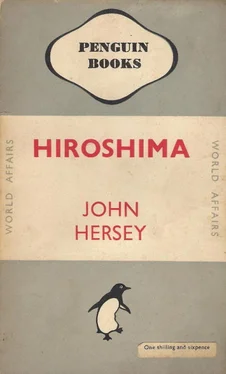John Hersey - Hiroshima
Здесь есть возможность читать онлайн «John Hersey - Hiroshima» весь текст электронной книги совершенно бесплатно (целиком полную версию без сокращений). В некоторых случаях можно слушать аудио, скачать через торрент в формате fb2 и присутствует краткое содержание. Город: London, Год выпуска: 1946, Издательство: Penguin Books, Жанр: История, на английском языке. Описание произведения, (предисловие) а так же отзывы посетителей доступны на портале библиотеки ЛибКат.
- Название:Hiroshima
- Автор:
- Издательство:Penguin Books
- Жанр:
- Год:1946
- Город:London
- ISBN:нет данных
- Рейтинг книги:4 / 5. Голосов: 1
-
Избранное:Добавить в избранное
- Отзывы:
-
Ваша оценка:
- 80
- 1
- 2
- 3
- 4
- 5
Hiroshima: краткое содержание, описание и аннотация
Предлагаем к чтению аннотацию, описание, краткое содержание или предисловие (зависит от того, что написал сам автор книги «Hiroshima»). Если вы не нашли необходимую информацию о книге — напишите в комментариях, мы постараемся отыскать её.
Hiroshima — читать онлайн бесплатно полную книгу (весь текст) целиком
Ниже представлен текст книги, разбитый по страницам. Система сохранения места последней прочитанной страницы, позволяет с удобством читать онлайн бесплатно книгу «Hiroshima», без необходимости каждый раз заново искать на чём Вы остановились. Поставьте закладку, и сможете в любой момент перейти на страницу, на которой закончили чтение.
Интервал:
Закладка:
Dr. Fujii, who was in his underwear, was now soaking and dirty. His undershirt was torn, and blood ran down it from bad cuts on his chin and back. In this disarray, he walked out onto Kyo Bridge, beside which his hospital had stood. The bridge had not collapsed. He could see only fuzzily without his glasses, but he could see enough to be amazed at the number of houses that were down all around. On the bridge, he encountered a friend, a doctor named Machii, and asked in bewilderment, “What do you think it was?”
Dr. Machii said, “It must have been a Molotoffano hanakago ”—a Molotov flower basket, the delicate Japanese name for the “bread basket,” or self-scattering cluster of bombs.
At first, Dr. Fujii could see only two fires, one across the river from his hospital site and one quite far to the south. But at the same time, he and his friend observed something that puzzled them, and which, as doctors, they discussed: although there were as yet very few fires, wounded people were hurrying across the bridge in an endless parade of misery, and many of them exhibited terrible burns on their faces and arms. “Why do you suppose it is?” Dr. Fujii asked. Even a theory was comforting that day, and Dr. Machii stuck to his. “Perhaps because it was a Molotov flower basket,” he said.
There had been no breeze earlier in the morning when Dr. Fujii had walked to the railway station to see his friend off, but now brisk winds were blowing every which way; here on the bridge the wind was easterly. New fires were leaping up, and they spread quickly, and in a very short time terrible blasts of hot air and showers of cinders made it impossible to stand on the bridge any more. Dr. Machii ran to the far side of the river and along a still unkindled street. Dr. Fujii went down into the water under the bridge, where a score of people had already taken refuge, among them his servants, who had extricated themselves from the wreckage. From there, Dr. Fujii saw a nurse hanging in the timbers of his hospital by her legs, and then another painfully pinned across the breast. He enlisted the help of some of the others under the bridge and freed both of them. He thought he heard the voice of his niece for a moment, but he could not find her; he never saw her again. Four of his nurses and the two patients in the hospital died, too. Dr. Fujii went back into the water of the river and waited for the fire to subside.
The lot of Drs. Fujii, Kanda, and Machii right after the explosion—and, as these three were typical, that of the majority of the physicians and surgeons of Hiroshima—with their offices and hospitals destroyed, their equipment scattered, their own bodies incapacitated in varying degrees, explained why so many citizens who were hurt went untended and why so many who might have lived died. Of a hundred and fifty doctors in the city, sixty-five were already dead and most of the rest were wounded. Of 1,780 nurses, 1,654 were dead or too badly hurt to work. In the biggest hospital, that of the Red Cross, only six doctors out of thirty were able to function, and only ten nurses out of more than two hundred. The sole uninjured doctor on the Red Cross Hospital staff was Dr. Sasaki. After the explosion, he hurried to a storeroom to fetch bandages. This room, like everything he had seem as he ran through the hospital, was chaotic—bottles of medicines thrown off shelves and broken, salves spattered on the walls, instruments strewn everywhere. He grabbed up some bandages and an unbroken bottle of mercurochrome, hurried back to the chief surgeon, and bandaged his cuts. Then he went out into the corridor and began patching up the wounded patients and the doctors and nurses there. He blundered so without his glasses that he took a pair off the face of a wounded nurse, and although they only approximately compensated for the errors of his vision, they were better than nothing. (He was to depend on them for more than a month.)
Dr. Sasaki worked without method, taking those who were nearest him first, and he noticed soon that the corridor seemed to be getting more and more crowded. Mixed in with the abrasions and lacerations which most people in the hospital had suffered, he began to find dreadful burns. He realized then that casualties were pouring in from outdoors. There were so many that he began to pass up the lightly wounded; he decided that all he could hope to do was to stop people from bleeding to death. Before long, patients lay and crouched on the floors of the wards and the laboratories and all the other rooms, and in the corridors, and on the stairs, and in the front hall, and under the porte-cochere, and on the stone front steps, and in the driveway and courtyard, and for blocks each way in the streets outside. Wounded people supported maimed people; disfigured families leaned together. Many people were vomiting. A tremendous number of schoolgirls—some of those who had been taken from their classrooms to work outdoors, clearing fire lanes—crept into the hospital. In a city of two hundred and forty-five thousand, nearly a hundred thousand people had been killed or doomed at one blow; a hundred thousand more were hurt. At least ten thousand of the wounded made their way to the best hospital in town, which was altogether unequal to such a trampling, since it had only six hundred beds, and they had all been occupied. The people in the suffocating crowd inside the hospital wept and cried, for Dr. Sasaki to hear, “ Sensei! Doctor!” and the less seriously wounded came and pulled at his sleeve and begged him to go to the aid of the worse wounded. Tugged here and there in his stockinged feet, bewildered by the numbers, staggered by so much raw flesh, Dr. Sasaki lost all sense of profession and stopped working as a skilful surgeon and a sympathetic man; he became an automaton, mechanically wiping, daubing, winding, wiping, daubing, winding.
Some of the wounded in Hiroshima were unable to enjoy the questionable luxury of hospitalization. In what had been the personnel office of the East Asia Tin Works, Miss Sasaki lay doubled over, unconscious, under the tremendous pile of books and plaster and wood and corrugated iron. She was wholly unconscious (she later estimated) for about three hours. Her first sensation was of dreadful pain in her left leg. It was so black under the books and debris that the borderline between awareness and unconsciousness was fine; she apparently crossed it several times, for the pain seemed to come and go. At the moments when it was sharpest, she felt that her leg had been cut off somewhere below the knee. Later, she heard someone walking on top of the wreckage above her, and anguished voices spoke up, evidently from within the mess around her: “Please help! Get us out!”
Father Kleinsorge stemmed Father Schiffer’s spurting cut as well as he could with some bandage that Dr. Fujii had given the priests a few days before. When he finished, he ran into the mission house again and found the jacket of his military uniform and an old pair of grey trousers. He put them on and went outside. A woman from next door ran up to him and shouted that her husband was buried under her house and the house was on fire; Father Kleinsorge must come and save him.
Father Kleinsorge, already growing apathetic and dazed in the presence of the cumulative distress, said, “We haven’t much time.” Houses all around were burning, and the wind was now blowing hard. “Do you know exactly which part of the house he is under?” he asked.
“Yes, yes,” she said. “Come quickly.”
They went around to the house, the remains of which blazed violently, but when they got there, it turned out that the woman had no idea where her husband was. Father Kleinsorge shouted several times, “Is anyone there?” There was no answer. Father Kleinsorge said to the woman, “We must get away or we will all die.” He went back to the Catholic compound and told the Father Superior that the fire was coming closer on the wind, which had swung around and was now from the north; it was time for everybody to go.
Читать дальшеИнтервал:
Закладка:
Похожие книги на «Hiroshima»
Представляем Вашему вниманию похожие книги на «Hiroshima» списком для выбора. Мы отобрали схожую по названию и смыслу литературу в надежде предоставить читателям больше вариантов отыскать новые, интересные, ещё непрочитанные произведения.
Обсуждение, отзывы о книге «Hiroshima» и просто собственные мнения читателей. Оставьте ваши комментарии, напишите, что Вы думаете о произведении, его смысле или главных героях. Укажите что конкретно понравилось, а что нет, и почему Вы так считаете.












